|
|
|
Sort Order |
|
|
|
Items / Page
|
|
|
|
|
|
|
| Srl | Item |
| 1 |
ID:
101376
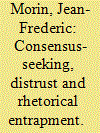

|
|
|
|
|
| Publication |
2010.
|
| Summary/Abstract |
While the WTO secretariat, key delegations, several NGOs, and industry publicly present the 30 August 2003 WTO Decision as an attempt to reconcile intellectual property with access to medicines, our research shows otherwise. We draw on qualitative analyses of 54 interviews and a lexicometric analysis of press releases to show that their enthusiastic public statements contrast deeply with their internal, cynical beliefs. Most of these actors not only consider the WTO Decision to be fundamentally flawed but claim to have known this prior to its adoption. We argue that a procedural norm of consensus-seeking impeded traditional bargaining over this sensitive issue and that distrust among participants hindered truth-seeking deliberation. Caught between strategic and communicative actions, state and non-state actors found themselves trapped in their own rhetoric of reconciling intellectual property with access to medicines. They realized that the appearance of a solution, rather than a functional solution, provided the only realistic outcome to a fruitless and publicly damaging continuation of debate. From a theoretical perspective, this case study sheds a new light on the gray zone between rational choice theory and constructivism, where both discourse and strategies matter. From an empirical perspective, it illustrates the risk of seeking consensus within international regimes when the procedural norm of consensus coexists with a high level of distrust.
|
|
|
|
|
|
|
|
|
|
|
|
|
|
|
|
| 2 |
ID:
136612


|
|
|
|
|
| Summary/Abstract |
Why do some countries adopt exogenous rules into their domestic law when those rules contravene their specific interests? We draw on the policy-diffusion literature to identify four causal mechanisms that we hypothesize explain the adoption of such rules. While existing literature treats these mechanisms as independent, we argue that each works in combination with the others to facilitate legal transplantation. While one mechanism—coercion—tends to initiate the transplantation process, it fades over time and three others largely supplant it: contractualization, socialization, and regulatory competition. These mechanisms act in a mutually supportive manner. We test our claims via a quantitative analysis of legal transplants in the field of intellectual property (IP) that incorporates an original index of IP protection in 121 developing countries over more than 14 years. This article concludes with a plea for theoretical eclecticism, acknowledging multicausality and context-conditionality. Any comprehensive explanation of legal transplantation must include the identification of mutual reinforcement between causal mechanisms, rather than simply rank their relative contributions.
|
|
|
|
|
|
|
|
|
|
|
|
|
|
|
|
| 3 |
ID:
153882
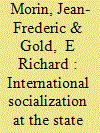

|
|
|
|
|
| Summary/Abstract |
This article synthesizes the results of two quantitative analyses, one at a macro and the second at a micro level, to shed light on the process of international socialization. The first analysis examines the seeming adoption of intellectual property norms at the state level while the second looks at the internalization of similar norms at the individual decision maker level. Both pay special attention to foreign education and capacity-building courses as carriers of US norms to developing countries. By triangulating the results of these analyses, we develop a more nuanced view of international socialization processes than analyses centred at only one level. We provide clear evidence that institutionalization of foreign norms often takes place prior to individual persuasion rather than as a result of it. We show that different socialization types (acculturation and persuasion) and the transmission of different idea types (causal and normative beliefs) may simultaneously operate in opposing directions. These conclusions reveal a bias in previous studies that focussed at only one level of analysis and support calls for greater eclecticism in the levels of analysis.
|
|
|
|
|
|
|
|
|
|
|
|
|
|
|
|
| 4 |
ID:
087686
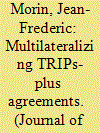

|
|
|
|
|
| Publication |
2009.
|
| Summary/Abstract |
This article examines the current wave of US bilateral agreements with respect to their strategic and political value at the plurilateral level. The US government has explicitly recognized its objective of leveraging bilateral agreements in order to influence regional and multilateral negotiations. Although it may be too early to assess the full effectiveness of this US strategy, the article argues that there are clear signs that the exploitation of bilateral agreements will not independently achieve the goal of strengthening plurilateral patent norms. This finding is supported by an assessment of six potential roads from bilateralism to plurilateralism: chain reaction, pressure for inclusion, coalition building, emulation, legal interpretation and adherence. The assertion that bilateral trade deals have a huge impact on international patent law making, made both by proponents and critics of the Agreement on Trade-Related Aspects of Intellectual Property Rights-Plus, is unsubstantiated. The author concludes that the US Government Accountability Office and Congress are justified in questioning whether the negotiation of these bilateral agreements, at least in the realm of intellectual property law, is a wise investment of US Trade Representative's resources.
|
|
|
|
|
|
|
|
|
|
|
|
|
|
|
|
| 5 |
ID:
117941
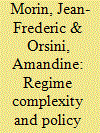

|
|
|
|
|
| Publication |
2013.
|
| Summary/Abstract |
This article looks at regime complexes from a state policymaking perspective. It develops a theoretical model in which regime complexes become
denser over time while governmental policymaking becomes more coherent. Underthis model, interactions between globalregime complexes and
national policymaking are twofold. On the one hand, greater policy coherence generates negotiated mandates asking for regime connections
and complex density. On the other hand, regime-complex density creates
more cohesive audiences, which increase incentives for national policy coherence. This co-adjustments model bringsstatesinto the discussion ofinstitutional interactions and critically questions the desirability and
feasibility of recent calls for joined-up government and whole-of-government approaches.
|
|
|
|
|
|
|
|
|
|
|
|
|
|
|
|
| 6 |
ID:
120714
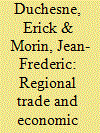

|
|
|
|
|
| Publication |
2013.
|
| Summary/Abstract |
Abstract This special issue investigates the new landscape of regional trade and economic negotiations. Contributors to this issue propose innovative theories and models to tackle an increasingly intricate web of trade-related issues that confront modern-day negotiators. In particular, they explore the structure, process and regional-international nexus of international trade and economic negotiations.
|
|
|
|
|
|
|
|
|
|
|
|
|
|
|
|
| 7 |
ID:
120715
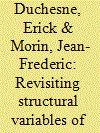

|
|
|
|
|
| Publication |
2013.
|
| Summary/Abstract |
Abstract This article offers a conceptual analysis of the negotiation of the Comprehensive Economic and Trade Agreement (CETA) between Canada and the European Union. It argues that traditional accounts of the structure of trade negotiations must be tailored for their novel nature, especially their wider scope on various regulatory issues and the relative economic weight of trading partners. To build our argument, we revisit traditional structural factors such as economic interdependence, non-agreement alternatives (NAA), institutional constraints, outcome valuations, and domestic support. We conclude that current and future bilateral trade negotiations will likely last longer, deadlocks will likely become more frequent, and that variations in scope will likely increase.
|
|
|
|
|
|
|
|
|
|
|
|
|
|
|
|
| 8 |
ID:
134251


|
|
|
|
|
| Summary/Abstract |
The first section of this article arranges the four theoretical approaches and methods presented in the special issues – namely interpretative constructivism, post-structuralism, discursive institutionalism and critical discourse analysis – along two dimensions: (a) the role of discourse in the constitution of the world, depending on whether approaches perceive social structure as being constitutive of or constituted by discourse; and (b) interpretation of the weight of material and ideational elements in discourses. This model helps to make sense of the profound theoretical diversity that characterises analytical approaches to international relations discourse. The second section tackles the question of ‘who does the speaking’. It identifies the different voices that converge in the EU’s international choir and problematises the discursive environment that forges international discourses through the theoretical lenses of selected approaches. In the last section, the contributions to this special issue are presented.
|
|
|
|
|
|
|
|
|
|
|
|
|
|
|
|
|
|
|
|
|